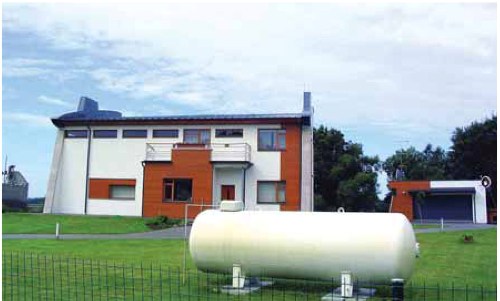P R O P A N E -
B U T A N E
The perspective
markets for LPG sales

According
to World LPGas
Association, in countries of Western
Europe and North America in 2006-2007 , 48,2% of liquid
petroleum gas was
consumed for homes
heating. Petrochemistry
industry and gas motor
vehicles all together consumed
less than 35% of LPG.
No
doubt the same trend will be observed in Russia
in near
future because of massive individual housing building in Russian
countryside.
According to Federal authorities estimates, by 2010 more
than 50% of new houses
in Russia
will be one family private
houses.
Still
there is a great problem with natural
gas supply in many regions of Russia.
At average only 40% of Russian territory is gasified. Besides
this gasification is spread very unevenly. For instance,
the North West
Federal region is gasified at 70% level. But this Federal region
includes Sanct-Petersberg
with its 100% gasification and Archangel
region with the level of gasification at
the level of 9% only. Therefore in the nearest
future an alternative
gas supply will be provided for new housing in those
places where there is no pipe
line gas network. And
it will be based
on propane-butane. One kilowatt of heat energy generated by
propane-butane is 2
times less expensive than diesel fuel generation. Besides, existing
Auto Gas
Fuelling Stations
(AGFS) work for gas vehicles at only 10% of their capacity. After
modernization
of their storage systems and introduction of new LPG auto carriers these AGFS
can function as
virtual gas distribution centers
at the nearby territory and can turn themselves from a position of gas
retailers into wholesale vendors. One LPG carrier can easily supply
with LPG
200-250 houses a month. The latter become permanent and reliable buyers
of LPG
from these AGFS which is very convenient and profitable.
Building of
small scale autonomous gas distribution centers for several dozens of
individual houses is a good business as such and it is affordable for
the
clients- houses owners. It
is estimated
that such a gas distribution center for 40 houses will cost about 56 000
rubles per house ( about
1,5 thousand US Dollars in winter of 2009). Each house
during heating season ( in Russia it lasts no
less than 6-8 months – from October to April inclusive) will
consume no less than
1500-2000
liters
of LPG a month, which proves that emerging LPG market for heating
purposes is
very perspective and profitable one.

( Russian LPG Auto Carrier)
An
Editorial comment.
2000 liters
of LPG a month
at the price of minimum 10 rubles per liter makes 20 000
rubles a month for heating purposes
only. It is more than average monthly wages of a Russian employee. Which means that such gas supply can be
afforded by well-off
people only, by those consumers who own some
business or are highly paid professional. For
the great majority of Russian citizens LPG gas supply is too costly.
Therefore
the “perspective LPG market” is really good but it
is limited
because LPG is too expensive
for ordinary Russian consumers.
In
fact the number of well-off consumers is big
enough but they work and have their high incomes in prosperous capitals
( Moscow
and Sanct-Petersberg) and big metropolitan
cities with a population
more than 1 million people. They
do
build big houses but they do it near these metropolitan cities where
the
problem of gasification is not so acute as in depressive regions
and villages where people have no extra money for autonomous gas
heating
systems. Rich people can easily afford the cost of such systems but the
limited
number of
such people does not allow to speak in terms of a mass consumers at
this, indeed, profitable emerging
market for LPG.
H O M
E
|



